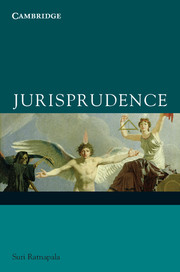Book contents
- Frontmatter
- Contents
- Acknowledgements
- List of Figures
- 1 Introduction
- PART 1 LAW AS IT IS
- PART 2 LAW AND MORALITY
- PART 3 SOCIAL DIMENSIONS OF LAW
- 7 Sociological Jurisprudence and Sociology of Law
- 8 Radical Jurisprudence: Challenges to Liberal Legal Theory
- 9 Economic Analysis of Law
- 10 Evolutionary Jurisprudence
- PART 4 RIGHTS AND JUSTICE
- References
- Index
7 - Sociological Jurisprudence and Sociology of Law
from PART 3 - SOCIAL DIMENSIONS OF LAW
- Frontmatter
- Contents
- Acknowledgements
- List of Figures
- 1 Introduction
- PART 1 LAW AS IT IS
- PART 2 LAW AND MORALITY
- PART 3 SOCIAL DIMENSIONS OF LAW
- 7 Sociological Jurisprudence and Sociology of Law
- 8 Radical Jurisprudence: Challenges to Liberal Legal Theory
- 9 Economic Analysis of Law
- 10 Evolutionary Jurisprudence
- PART 4 RIGHTS AND JUSTICE
- References
- Index
Summary
Sociological jurisprudence and its related field sociology of law together constitute an immense field of study, embracing all aspects of the relations and interactions between law and society. Legal positivism and natural law theory are focused on a central question in legal theory. In the case of legal positivism it concerns the formal tests for identifying a law. Natural law theory is mainly about the relation between law and morality. The methodology of legal positivism is empiricism and logical reasoning and, in the case of Kelsen, transcendental idealism and logical reasoning. The methodology of natural law is mainly practical reason. Thus, legal positivism and natural law theory are limited by both their aims and their methodology.
American legal realism threw open the door of jurisprudence to admit facts about the way the legal system actually operates in society. The rule sceptics focused on the differences between the law as written down and the law as applied in particular cases by the appellate courts. The fact sceptics studied the uncertainties that attend the trial process. The rule sceptics argued that if judges are the real law makers, they might as well take that role seriously and do it more openly and competently by taking explicit account of the social consequences of their decisions. Legal realism of the American kind broadened the scope of jurisprudence by connecting what lawyers and judges actually do with the society that they are asked to serve through the processes of the law.
- Type
- Chapter
- Information
- Jurisprudence , pp. 185 - 211Publisher: Cambridge University PressPrint publication year: 2009



